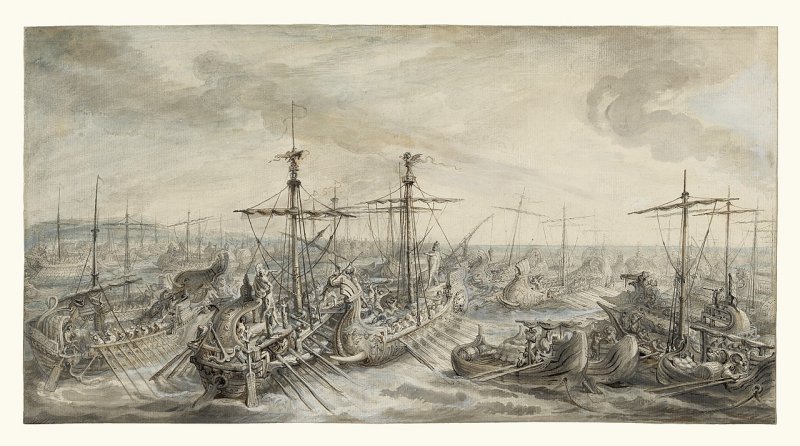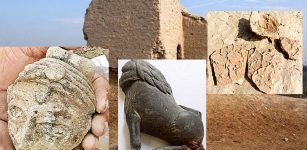Battle Of Cape Ecnomus: One Of The Greatest Naval Battles In History
Conny Waters - AncientPages.com - In 256 BC, during the First Punic War (264-241 B.C.) one of the greatest naval battles in history took place off the coast of Sicily, Italy.
As many as 330 ancient Roman ships confronted 350 Carthaginian ships. The struggle was long and many lives were lost. The fight between these two huge ancient powers is today known as the Battle Of Cape Ecnomus.
 The Naval Battle Near Ecnomus (256 BC) Description of The Roman Fleet Victorious over the Carthaginians at the Battle of Cape Ecnomus; This drawing is one of a series of illustrations Saint-Aubin made in the 1760s for an ambitious history of Rome. Engravings after drawings as well as maps were to accompany this multi-volume series which was never completed. In 1789, twenty-nine engraved plates from Saint-Aubin's drawings illustrated a more modest Roman history. Gabriel de Saint-Aubin - J. Paul Getty Museum - Public Domain
The Naval Battle Near Ecnomus (256 BC) Description of The Roman Fleet Victorious over the Carthaginians at the Battle of Cape Ecnomus; This drawing is one of a series of illustrations Saint-Aubin made in the 1760s for an ambitious history of Rome. Engravings after drawings as well as maps were to accompany this multi-volume series which was never completed. In 1789, twenty-nine engraved plates from Saint-Aubin's drawings illustrated a more modest Roman history. Gabriel de Saint-Aubin - J. Paul Getty Museum - Public Domain
Ancient Romans tried to control the Mediterranean Sea, but they had a great enemy that could not be easily defeated – the Carthaginians.
Carthage was without doubt one of Rome’s toughest adversaries in regard to control of the Mediterranean Sea.
In 256, the Romans sent a fleet of no less than 330 ships from Sicily to Africa, where the army aboard was supposed to strike at the Carthaginian homeland. Before crossing the Mediterranean, it encountered a Carthaginian navy of 350 ships, not far from modern Licata, at Ecnomus, an early third-century city founded by refugees from Gela, The site has been identified at Poggio di Sant' Angelo.
Both sides thought that they fought now on equal terms, and both threw themselves most thoroughly into the task of organizing naval forces and disputing the command of the sea.
Each of the ships had around 300 rowers and 120 combat troops, which adds up to a total of some 300,000 men. Even though they had fewer ships, the Romans won after a long struggle and only suffered around 10,000 casualties while the Carthaginians lost more than 40,000.
The war was not over yet, though. Carthage would stay a formidable archenemy of the Roman Empire for many years to come.
K. Tipps explained that “at least three major questions emerge from the modern controversy over Ecnomus. The first concerns the numbers, both of men and ships, engaged in the battle; the figures provided by Polybius have been manipulated in modern scholarship, and with generally negative effects on our understanding.
The second item in need of correction is the largely skeptical attitude adopted in modern times towards the battle formation of the Roman fleet as described by Polybius. Here again, it is the testimony of Polybius himself that is more persuasive than the arguments of his critics.
The third question concerning the battle is perhaps the most difficult: the action at Ecnomus gives the appearance of having been determined and guided by the Carthaginian commanders, but victory – by a decisive margin – went to Rome. By what means was the comparatively inexperienced Roman fleet able to defeat a Carthaginian force roughly equal and probably slightly superior in size, under conditions that were likewise largely equal and, if anything, favored the Carthaginians? This is the opposite of the result that we would naturally expect, and one that still cries out for explanation. “ 1
According to Tipps, “ the Roman victory at Ecnomus was most directly the result of a serious blunder – not on the part of the Carthaginians, but rather of the Romans themselves, who emerged as accidental victors when their illogical and unpredictable behavior in the opening phase of the action fatally disrupted the tactics prepared by the Punic admirals.“
Written by Conny Waters – AncientPages.com Staff Writer
Copyright © AncientPages.com All rights reserved. This material may not be published, broadcast, rewritten or redistributed in whole or part without the express written permission of AncientPages.com
Expand for references- Tipps, G. K. "The Battle of Ecnomus." Historia: Zeitschrift Für Alte Geschichte 34, no. 4 (1985): 432-65. http://www.jstor.org/stable/4435938.
- Walbank, F. W. "Polybius, Philinus, and the First Punic War." The Classical Quarterly 39, no. 1/2 (1945): 1-18. http://www.jstor.org/stable/637362.
More From Ancient Pages
-
 Oldest Human Remains Unearthed In Vietnam
Archaeology | Nov 15, 2023
Oldest Human Remains Unearthed In Vietnam
Archaeology | Nov 15, 2023 -
 Ancient Maya: Wealth Inequality And Despotism That Governed The Society
Archaeology | Mar 26, 2021
Ancient Maya: Wealth Inequality And Despotism That Governed The Society
Archaeology | Mar 26, 2021 -
 On This Day In History: Vespasian Was Elected The Roman Emperor – On July 1, 69 A.D.
News | Jul 1, 2016
On This Day In History: Vespasian Was Elected The Roman Emperor – On July 1, 69 A.D.
News | Jul 1, 2016 -
 Buddhist ‘Dillu Roy’ Resembles Mohenjo Daro And Harappa And Now Unveils Its Ancient Secrets
Archaeology | Aug 25, 2020
Buddhist ‘Dillu Roy’ Resembles Mohenjo Daro And Harappa And Now Unveils Its Ancient Secrets
Archaeology | Aug 25, 2020 -
 A 900-Year-Old Crusader Sword Discovered Off The HaCarmel Coast, Israel
Archaeology | Oct 20, 2021
A 900-Year-Old Crusader Sword Discovered Off The HaCarmel Coast, Israel
Archaeology | Oct 20, 2021 -
 Pitted Ware Culture – Neolithic Scandinavians Used Skin Boats To Trade And Travel Across Large Distances
Archaeology | Sep 11, 2024
Pitted Ware Culture – Neolithic Scandinavians Used Skin Boats To Trade And Travel Across Large Distances
Archaeology | Sep 11, 2024 -
 Biblical Event Verified By Study Of Earth’s Magnetic Field?
Archaeology | Jan 4, 2024
Biblical Event Verified By Study Of Earth’s Magnetic Field?
Archaeology | Jan 4, 2024 -
 Ancient Desert Mystery – Did Thousands Vanish Without A Trace Because Of An Ominous Prophecy And Revenge?
Ancient Mysteries | Nov 28, 2022
Ancient Desert Mystery – Did Thousands Vanish Without A Trace Because Of An Ominous Prophecy And Revenge?
Ancient Mysteries | Nov 28, 2022 -
 Mysterious Ancient Figure Depicted On A Jade Cong May Re-Write History Of China
Artifacts | Oct 11, 2019
Mysterious Ancient Figure Depicted On A Jade Cong May Re-Write History Of China
Artifacts | Oct 11, 2019 -
 Cherokee Gourd Rattles – Protection Against Evil Spirits And Other Danger
Ancient Traditions And Customs | Jun 7, 2019
Cherokee Gourd Rattles – Protection Against Evil Spirits And Other Danger
Ancient Traditions And Customs | Jun 7, 2019 -
 Neolithic Boats At La Marmotta Reveal People Used Advanced Nautical Technology 7,000 Years Ago
Archaeology | Mar 22, 2024
Neolithic Boats At La Marmotta Reveal People Used Advanced Nautical Technology 7,000 Years Ago
Archaeology | Mar 22, 2024 -
 Veles And Perun: Most Powerful Slavic Gods In Conflict Between Powers Of Light And Darkness
Featured Stories | Jun 26, 2017
Veles And Perun: Most Powerful Slavic Gods In Conflict Between Powers Of Light And Darkness
Featured Stories | Jun 26, 2017 -
 What Can The Fate Of Ancient Cities Teach Us About Surviving Climate Change
Archaeology | Oct 1, 2021
What Can The Fate Of Ancient Cities Teach Us About Surviving Climate Change
Archaeology | Oct 1, 2021 -
 Story Behind A Huge Mysterious Ancient Rock Art Site In Central Queensland Revealed By Scientists
Archaeology | Sep 21, 2022
Story Behind A Huge Mysterious Ancient Rock Art Site In Central Queensland Revealed By Scientists
Archaeology | Sep 21, 2022 -
 Inca Llajta: Largest And Most Impressive Inca Complex In Bolivia
Civilizations | Dec 6, 2018
Inca Llajta: Largest And Most Impressive Inca Complex In Bolivia
Civilizations | Dec 6, 2018 -
 Massive Underground Anomaly – Iron Ages Temples And Seat Of Legendary Ulster Kings Discovered At Navan Fort?
Archaeology | Jul 21, 2020
Massive Underground Anomaly – Iron Ages Temples And Seat Of Legendary Ulster Kings Discovered At Navan Fort?
Archaeology | Jul 21, 2020 -
 On This Day In History: Mount Fuji Erupted – On Dec 16, 1707
News | Dec 16, 2016
On This Day In History: Mount Fuji Erupted – On Dec 16, 1707
News | Dec 16, 2016 -
 Mystery Of The Lost Anglo-Saxon Queen Cynethryth May Soon Be Solved By Archaeologists
Archaeology | Aug 2, 2022
Mystery Of The Lost Anglo-Saxon Queen Cynethryth May Soon Be Solved By Archaeologists
Archaeology | Aug 2, 2022 -
 Medieval Warhorses Were Pony-Sized And Much Smaller Than Previously Thought
Archaeology | Jan 11, 2022
Medieval Warhorses Were Pony-Sized And Much Smaller Than Previously Thought
Archaeology | Jan 11, 2022 -
 Facial Reconstruction Of 3.8-Million-Year-Old Skull Shows What Our Ancestors Really Looked Like
Archaeology | Dec 29, 2022
Facial Reconstruction Of 3.8-Million-Year-Old Skull Shows What Our Ancestors Really Looked Like
Archaeology | Dec 29, 2022
